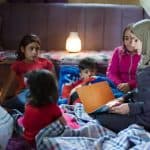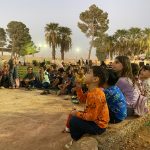Written by: Harry Badwan
I wasn’t sure if my interview with Omar would take place, as the clock reminded me that 30 minutes had passed after our scheduled appointment. Just as I was considering rescheduling, I received a message from our contact with good news: Omar was ready to talk. And so, I called his number, not knowing what to expect.
I had a few details about Omar before our call: he was a young man from Deir ez-Zor, Syria, now living as a refugee in the Turkish city of Urfa, where less than ideal finances had interrupted his degree in industrial engineering—an interruption that Omar was looking to remedy by applying to university in Hanover, Germany. Often, it’s these nuances that exist within the stories of people living as refugees that are lost to glib headlines and government statistics.
As the WhatsApp call connected, I was finally able to put a face to the name. Here was Omar, a 20-year-old Syrian man with round, smiling cheeks, dark eyes, a beard and a crew-cut of blackish-brown hair.
As he apologised for his lateness, he informed me that, because of the nature of his work (shifts loading and unloading produce at a vegetable market) he often arrives home late.
“I wake up at 6am. I pray. I put on my clothes and go to work for 8am. Then I get back at 9 or 10pm,” he tells me.
When he does return, Omar has little in the way of free time. What free time he does have, he spends reading the Qur’an and practising his German. I remark that these must be long days for him, but Omar is not preoccupied with whether or not his work is tiring—he’s much more concerned about something else: its tedium.
“It’s a boring life,” he tells me. I sense the enthusiasm drain from his voice. “I love studying,” he says excitedly, before quickly adding, “but I don’t feel good at the moment because I’m not studying.”
This is the bind that Omar finds himself in. He wanted something different, but the demands of his situation have forced him to act out of necessity. Omar’s three sisters are unable to work due to the challenges of working as female refugees in Turkey. So, they stay at home and help his mother take care of the house. Omar’s little brother is only 12. With Omar’s father having already made the crossing to Germany, Omar’s entire family depends on his salary from the vegetable market. From this income, he covers all of their utility bills, rent and food costs. This dependence further complicates Omar’s dream of studying in Germany; he would only make the trip if his family were allowed to join him.
I was curious as to why the situation in Urfa had become untenable for Omar and his family. After all, Omar had been there for nine years since his family fled the war. He had grown up immersed in Turkish culture and was fluent in the language. For all intents and purposes, he had settled in. So, what had changed?
When explaining why he felt he and his family had to leave, Omar drew heavily from his personal experience of how refugees are treated in Turkey. He spoke of a reality where, yes, he had spent nine years there and yes, he was fluent in Turkish. But, in spite of this, he was still not considered a Turkish citizen and he never would be. One example Omar mentioned was in reference to a group of former friends that Omar was longer in touch with. He says they ‘broke up’ with him because he’s Syrian. These experiences ended Omar’s ambition to achieve Turkish citizenship. He saw no future there and that’s when he looked to Germany.
But the possibility of Omar having a future in Hanover is also subject to much doubt. Omar has still not heard if he will be accepted into university. He seemed stoic about his prospects: if he didn’t make it this year then he would simply try again in the next.I asked Omar, in the face of so much uncertainty about the future, what kept him going. He replied with a smile.
“If you’ve got a solution, there’s no need to worry.”



